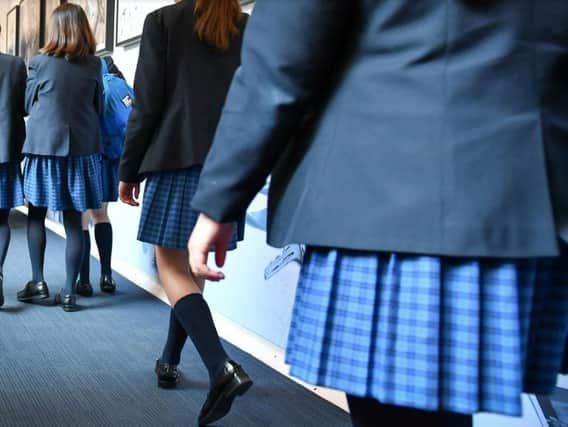Sexual harassment is ‘normal’ for children


Children often do not see the point of reporting sexual harassment because it happens so frequently, while many teachers consistently underestimate the scale of these problems, an Ofsted report suggests.
Boys are sharing “nudes” among themselves like a “collection game” on platforms such as WhatsApp and Snapchat, Ofsted inspectors were told, while some girls have experienced “unwanted touching in school corridors”.
Advertisement
Hide AdAdvertisement
Hide AdThe watchdog visited 32 state and private schools and colleges and spoke to more than 900 young people about sexual harassment after thousands of testimonials were posted on a website.
In April, the Government asked the schools watchdog to look at safeguarding policies in schools and colleges following the deluge of anonymous reports made to website Everyone’s Invited.
Amanda Spielman, chief inspector of schools, said the findings of the review “shocked” her as she called for sexual harassment to “have no place” in the country’s schools and colleges.
She said: “It’s alarming many children and young people, particularly girls, feel they have to accept sexual harassment as part of growing up.
Advertisement
Hide AdAdvertisement
Hide Ad“Whether it’s happening at school or in their social life, they simply don’t feel it’s worth reporting. This is a cultural issue; it’s about attitudes and behaviours becoming normalised, and schools and colleges can’t solve that by themselves.”
The review found around nine in 10 of the girls that inspectors spoke to said that sexist name calling and being sent unwanted explicit pictures or videos happened “a lot” or “sometimes”.
Most children felt that the relationships, sex and health education (RSHE) they received did not give them the information and advice they needed to navigate the reality of their lives.
Girls were frustrated that there was not clear teaching of what constitutes acceptable and unacceptable behaviour, and many had turned to social media or their peers to educate each other.
Advertisement
Hide AdAdvertisement
Hide AdOne female pupil told inspectors: “It shouldn’t be our responsibility to educate boys.”
Many teachers said they do not feel prepared to teach outside their subject specialism, or lack knowledge on topics such as consent, healthy relationships and sharing of sexual images.
Ofsted is calling on school and college leaders to develop a culture where all kinds of sexual harassment are recognised and addressed, including with sanctions when appropriate.
It adds that the time should be allocated in the RSHE curriculum for topics that young people find difficult, such as consent and sharing explicit images.
Advertisement
Hide AdAdvertisement
Hide AdThe review also calls on the Government to consider the findings of the review as it develops the Online Safety Bill, in order to strengthen online safeguarding controls for children and young people.
Ms Spielman added: “The Government needs to look at online bullying and abuse, and the ease with which children can access pornography.
“But schools and colleges have a key role to play.
“They can maintain the right culture in their corridors and they can provide RSHE that reflects reality and equips young people with the information they need.”
Geoff Barton, general secretary of the Association of School and College Leaders (ASCL), said: “Nobody can fail to be shocked by the finding that children and young people don’t see any point in reporting sexual harassment because it is seen as a normal experience.”
Advertisement
Hide AdAdvertisement
Hide AdHe added: “It seems that a gulf has opened up between what children and young people experience in terms of everyday sexual harassment and abuse and what adult understanding is of the scale and severity of this issue.
“It is a generational divide which goes beyond schools and colleges and points to a much wider societal problem.
“The reasons why sexual harassment has become such a widespread issue are complex but it seems obvious that more must be done with greater urgency to tackle the misuse of social media and the availability of online pornography.”
Thanks for reading. If you value what we do and are able to support us, a digital subscription is just £1 for your first month. Try us today by clicking here and viewing our offers.